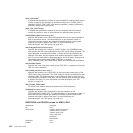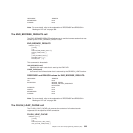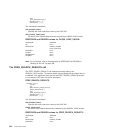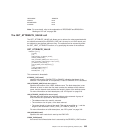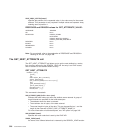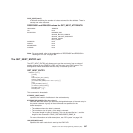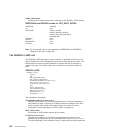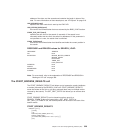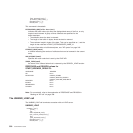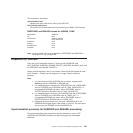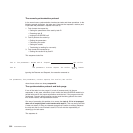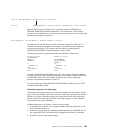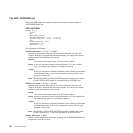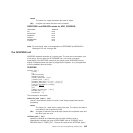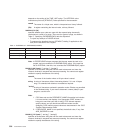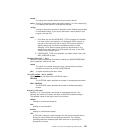[LDAP_RESPONSE(name4),]
[ATTRIBUTE_COUNT(name4),]
RESPONSE(name1 | *),
REASON(name1 | *)]
This command is threadsafe.
DISTINGUISHED_NAME(buffer-descriptor)
indicates the buffer where you want the distinguished name of the first, or only
located result returned. A group of three fullwords are specified for the
buffer-descriptor:
v The address where the data is returned.
v The length of the buffer in bytes, where the data is returned.
v The maximum length in bytes of the data. This can be specified as *, and the
length is then returned in DDAP_DISTINGUISHED_NAME_N.
For more information on buffer-descriptors, see “XPI syntax” on page 319.
ATTRIBUTE_COUNT(name4)
a fullword indicating the number of attributes that can be browsed in the current
entry.
LDAP_RESPONSE(name4)
specifies the return code that is sent by the LDAP API.
SEARCH_TOKEN(name4)
the name of the fullword token that is returned by the SEARCH_LDAP function.
RESPONSE and REASON values for
START_BROWSE_RESULTS:
RESPONSE REASON
OK None
EXCEPTION INVALID_TOKEN
INVALID_BUFFER_LENGTH
INVALID_CALLING_SEQUENCE
DISASTER None
INVALID None
KERNERROR None
PURGED None
Note: For more detail, refer to the explanation of RESPONSE and REASON in
“Making an XPI call” on page 308.
The UNBIND_LDAP call
The UNBIND_LDAP call terminates a session with an LDAP server.
UNBIND_LDAP
DFHDDAPX [CALL],
[CLEAR],
[IN,
FUNCTION(UNBIND_LDAP),
LDAP_SESSION_TOKEN(name4),]
[OUT,
[LDAP_RESPONSE(name4),]
RESPONSE(name1 | *),
REASON(name1 | *)]
330 Customization Guide



